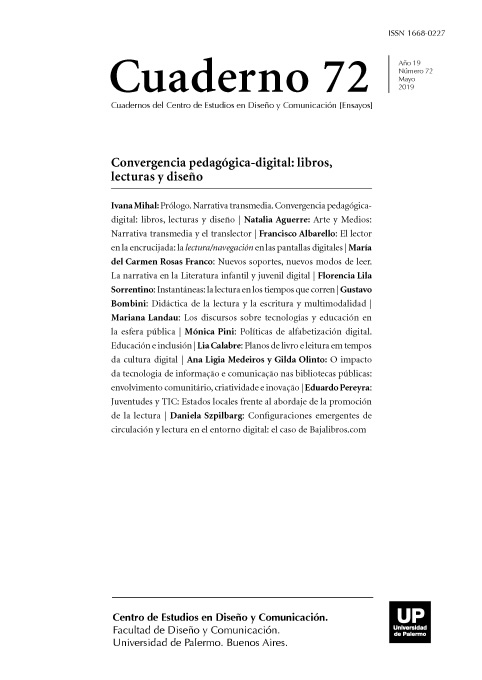O impacto da tecnologia de informação e comunicação nas bibliotecas públicas: envolvimento comunitário, criatividade e inovação
Abstract
Contemporary society is characterized by new ways of accessing and dealing with cultural goods, as a consequence of the general increase in the use of information and communication technologies. The public library, as one of the more traditional public institutions guaranteeing free access to information and reading, has to adapt its actions to these new demands of society. This article aims at bringing about new perspectives that seem to represent efforts to attend these new demands. It analyses the tendency of the institution in the direction of strengthening its relations with the surrounding community, contributing to its social and economic development, notably through incentives in the formation of its social capital, to its creativity and innovation and also to its access to new modes of reading.
References
Aabo, S., Audunson, R., & Varheim (2010). How do public libraries function as meeting places? Library & Information Science Research, 32, pp. 16-26.
Agnoli, A. (2011). Bibliotecas de Profundis? Per il neoliberismo anche le biblioteche devono morire. Controlacrisi, 26 abr. 2011. Recuperado em 5 setembro 2016. Disponible em: http://www.controlacrisi.org/notizia/Conoscenza/2011/4/26/12106-PER-IL-NEOLIBERISMO-ANCHE-LE-BIBLIOTECHE-DEVONO-MORIRE/
Andrade, M. (1957). “Um depoimento de Mário de Andrade”. Revista do Livro,2 (5), pp. 7-8.
Audunson, R. (2005). The public library as a meeting place in a multicultural and digital context: the necesity of low-intensive meeting places. Journal of Documentation, vol. 61 (3), pp. 429-441. Disponible en: http://dx.doi.org/10.1108/00220410510598562
Belbin, N., & Newcombe, P. (2013). “Fab Labs at the Library”. Education Digest, 78, pp. 65-68.
Betancur, A. M. (2002). “La biblioteca pública en la perspectiva del desarrollo local: una estrategia para la democracia”. Proceedings of the Council and General Conference, IFLA, 68, Glasgow. Disponible en: http://www.atechchubut.org/descarga/bibliotecaspublicas.pdf
Bishop Peterson, A. et al. (2000). “Socially grounded user studies in digital library development”. First Monday, 5, (6). Disponible en: http://www.firstmonday.org/ojs/index.php/fm/article/view/760/669
Bourdieu, P. (1985). “The social space and the genesis of groups”. En Theory and Society, 14, (6), pp. 723-775.
Britton, L. (October 26, 2012) A Fabulous labaratory: the makerspace at Fayetteville Free Library. Public libraries online. Retrieved December 10, 2016. Disponible en: http://publiclibrariesonline.org/2012/10/a-fabulous-labaratory-the-makerspace-at-fayetteville-free-library/
Colegrove, P. T. (2017). “Makerspaces in libraries: technology as catalyst for better learning, better teaching”. Ingeniería solidaria, abril, 13 (21), pp. 19-26. Retrieved March 2, 2017, https://revistas.ucc.edu.co/index.php/in/article/view/1724/1842
Correia, Z. (2010). “A biblioteca pública como espaço de cidadania”. Retieved October 20, 2011. Disponible en: http://www.evora.net/bpe/2005bicentenario/dias/27_out05/textos/zita.pdf.
Cox, E. et al. (2000). “A safe place to go: libraries and social capital”. Sydney: University of Technology: State Library of New South Wales. Retrieved July 7, 2009. Disponible en: http://www.sl.nsw.gov.au/services/public_libraries/docs/safe_place.pdf.
Darnton, R. (2010). A questão dos livros: passado, presente e futuro. São Paulo: Companhia das Letras.
Durrance, J. C., & Pettigrew, K. E. (2001). “Towards context-centered methods for evaluating public library networked community information initiatives”. Disponible en: http://www.First Monday, 6, (4).
Gaus, E. R., & Weech, T. (2008). The Meeting Room: Libraries as Community Centers for Culturally Diverse Populations. In BOBCATSSS, pp. 221-227. Retrieved August 20, 2012. Disponible en: https://edoc.hu-berlin.de/bitstream/handle/18452/1954/gaus.pdf?sequence=1&isAllowed=y
Gong, H., Japzon, A. C., & Chen, C. (2008). “Public libraries and social capital in three New York neighborhoods”. Tijdschrift voor economische en sociale geografie, 99, (1), pp. 65-83.
Hillenbrand, C. (2004). Public libraries as developers of social capital: changing roles, values and missions. Master on Arts, University of South Australia School of Communication, Information and New Media.
IFLA. (2002). O Manifesto da IFLA sobre a internet. Recuperado em 09 abril, 2012. Disponible em: http://archive.ifla.org/iii/misc/im-pt-br.htm.
IFLA. Manifesto da IFLA/UNESCO sobre Bibliotecas Públicas. (1994). Recuperado em 09 abril, 2012. Disponible em: http://archive.ifla.org/VII/s8/unesco/port.htm.
Lankes, R. (2012). The bad, the good, and the great. Syracuse, NY. University of Syracuse. Retrieved March 5, 2017. Disponible en: https://davidlankes.org/rdlankes/Presentations/2012/Syracuse.pdf
Lankes, R. D. (2012). Beyond the bullet points: libraries are obsolete. Blog R. D. Lankes. Retrieved March 5, 2017 from https://davidlankes.org/?p=1567
Maciel, F., A. Rego et al. (2010). “Capital social e bibliotecas públicas: estudos empíricos”. Em Perspectivas em Ciência da Informação, 15 (2), pp. 73-88.
Marshall, T. H. (1967). Cidadania, classe social e status. Rio de Janeiro: Zahar.
Medeiros, A. L. (2015). Desconhecida pela comunidade e desprezada pelas autoridades: a biblioteca pública no Brasil na opinião de atores políticos e pesquisadores. Tese de doutorado. Programa de Pós-Graduação em Ciência da Informação/ Instituto Brasileiro de Informação em Ciência e Tecnologia/ Universidade Federal do Rio de Janeiro/ Escola de Comunicação, Rio de Janeiro, 2015.
Medeiros, A. L. (2010). Biblioteca e cidadania. Sinais sociais, 4 (13), pp. 10-45.
Olinto, G., & Medeiros, A. L. (2013). “Capital social e biblioteca pública”. En: Albagli, Sarita. (Org.). Fronteiras da Ciência da Informação, pp. 236-256. Brasília: IBICT.
Olinto, G., & Medeiros, A. L. (2012). “El uso de internet e inclusión social en Brasil: la contribución de las bibliotecas públicas”. En Anais do Seminário Hispano Brasileño de Investigación en Información, Documentación y Sociedad, 1, pp. 461-176. Madrid. Disponible en: http://eprints.ucm.es/25190/1/portada_Investigaci%C3%B3n%20en%20informacion%20documentacion%20y%20sociedad1.pdf
Pinsky, J., & Pinsky, C. Bassanerzi (Org.). (2005). História da cidadania. 3. ed. São Paulo: Contexto.
Putnam, R. D. (1995). Bowling alone: America’s declining social capital. Journal of Democracy, 6, (1), pp. 66 -78.
Putnam, R. D. (2000). Bowling alone: the collapse and revival of American and revival of American community. New York: Simon & Shuster.
Waller, V. & Mcshane, I. (2008). Analyzing the challenges for large public libraries in the Twenty-first Century: a case study of the State Library of Victoria in Australia. First Monday, 13 (12). Retrieved March 5, 2017. Disponible en: http://journals.uic.edu/ojs/index.php/fm/article/view/2155
Agradecimento
Agradecemos ao CNPq (Conselho Nacional de Desenvolvimento Científico e Tecnológico) por apoio a projeto de pesquisa.
Los autores/as que publiquen en esta revista ceden los derechos de autor y de publicación a "Cuadernos del Centro de Estudios de Diseño y Comunicación", Aceptando el registro de su trabajo bajo una licencia de atribución de Creative Commons, que permite a terceros utilizar lo publicado siempre que de el crédito pertinente a los autores y a esta revista.


